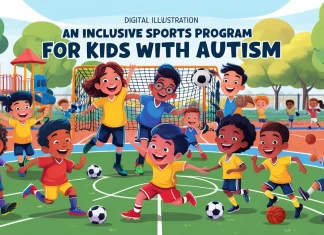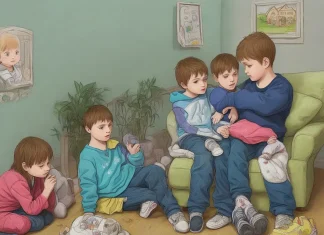Introduction
Imagine growing up with a sibling who has Down Syndrome or Autism. These conditions come with unique challenges, both for the individuals affected and their families. As a sibling, you play a crucial role in providing support, understanding, and companionship. In this article, we will explore the significance of sibling support for individuals with Down Syndrome and Autism and discuss effective strategies to enhance the sibling bond and overall family well-being.
Definition of Down Syndrome and Autism
Down Syndrome is a genetic disorder characterized by an extra copy of chromosome 21. It leads to developmental delays, cognitive impairments, and distinct physical features. On the other hand, Autism is a neurodevelopmental disorder that affects social interaction, communication, and behavior. Both conditions require lifelong support and care.
Overview of Sibling Relationships
Siblings share a unique bond that is often characterized by love, friendship, and shared experiences. Siblings of individuals with Down Syndrome or Autism often navigate additional complexities in their relationships. They may experience a mix of emotions, including love, frustration, compassion, and concern.
Importance of Sibling Support
Sibling support plays a vital role in the overall well-being of individuals with Down Syndrome or Autism. It provides emotional support, promotes advocacy and education, and fosters a sense of belonging within the family unit. Siblings can also positively influence their brother or sister’s social, emotional, and cognitive development.
Understanding Down Syndrome
Causes and Characteristics of Down Syndrome
Down Syndrome occurs due to the presence of an extra copy of chromosome 21. It leads to physical and intellectual disabilities, including delayed motor skills, cognitive impairments, and potential health issues such as heart defects and hearing problems. However, each individual with Down Syndrome is unique and may have varying abilities and challenges.
Impact on Individuals and Families
The presence of Down Syndrome within a family can bring both joys and challenges. Families may face additional financial and emotional burdens, including the need for specialized medical care, therapies, and educational support. Siblings may also experience feelings of responsibility and the need to protect their brother or sister.
Understanding Autism
Causes and Characteristics of Autism
Autism is a complex neurodevelopmental disorder with no singular cause. It is characterized by difficulties in social interaction, communication, and repetitive behaviors. Individuals with Autism may have sensory sensitivities, struggles with verbal and nonverbal communication, and exhibit unique strengths and interests.
Impact on Individuals and Families
Autism can significantly impact individuals and their families, requiring specialized support and interventions. Families may face challenges in accessing appropriate educational resources, therapies, and navigating social interactions. Siblings may witness their brother or sister’s struggles, leading to feelings of empathy and the need for support.
Sibling Relationships
Sibling Dynamics
Siblings often have a significant influence on each other’s lives. They share a history, memories, and a deep connection. Siblings of individuals with Down Syndrome or Autism may experience a range of emotions, including love, compassion, frustration, and even resentment. It is important to acknowledge and address these emotions openly and honestly.
Unique Challenges for Siblings
Siblings of individuals with Down Syndrome or Autism face unique challenges in their upbringing. They may witness their parents’ attention and resources being directed toward their sibling’s needs. This can sometimes create feelings of neglect or a sense of responsibility beyond their age. It is crucial to support siblings in navigating these challenges and ensuring they receive the care and attention they need.
Importance of Sibling Support
Emotional Support
Siblings can provide emotional support to their brother or sister with Down Syndrome or Autism. Being a caring listener, offering encouragement, and being a constant source of love and acceptance can significantly impact their well-being. It is important for siblings to understand that their support matters and can make a real difference in their sibling’s life.
Advocacy and Education
Siblings often become advocates for their brother or sister with Down Syndrome or Autism. They can educate others about the conditions, dispel misconceptions, and promote inclusivity and acceptance. Empowering siblings to become advocates helps create a more understanding and supportive community.
Enhancing Sibling Bond
Nurturing a strong sibling bond is essential. Shared activities, experiences, and quality time together can strengthen the bond between siblings. Encouraging mutual understanding and celebrating accomplishments can create lasting memories and foster a sense of connection.
Strategies for Supporting Siblings
Encouraging Open Communication
Open communication within the family is crucial for addressing any concerns or emotional challenges. Providing a safe space for siblings to express their feelings, ask questions, and share experiences helps create a supportive environment.
Providing Resources and Information
Equipping siblings with relevant resources and information about Down Syndrome and Autism can enhance their understanding and ability to provide support. Books, articles, and online resources tailored to their age group can be valuable tools for learning and fostering empathy.
Promoting Self-Care for Siblings
Siblings may experience emotional and mental strain in their caregiving role. Encouraging self-care activities, such as pursuing hobbies, spending time with friends, and seeking support from trusted adults, helps maintain their well-being and resilience.
Professional Support
The Role of Therapists and Counselors
Therapists and counselors specializing in Down Syndrome and Autism can provide valuable support to both individuals and their siblings. Seeking professional guidance can help siblings navigate their own emotions and develop strategies for coping with challenges.
Sibling Support Groups
Joining sibling support groups allows siblings to connect with others who share similar experiences. These groups provide a supportive environment where siblings can share their concerns, learn from each other, and find comfort in knowing they are not alone.
Collaborating with Healthcare Providers
Collaborating with healthcare providers involved in the care of their sibling can help siblings better understand the medical aspects of Down Syndrome or Autism. It also allows them to actively participate in their sibling’s care and advocate for their needs.
Building Strong Sibling Bonds
Shared Activities and Experiences
Engaging in shared activities and experiences can foster a sense of togetherness and create positive memories. Whether it’s playing games, going on outings, or participating in hobbies together, these shared moments strengthen the sibling bond.
Celebrating Accomplishments
Acknowledging and celebrating the achievements of both siblings helps cultivate a positive and supportive environment. Recognizing each sibling’s unique talents and accomplishments fosters a sense of pride and boosts their self-esteem.
Encouraging Mutual Understanding
Promoting open dialogue and empathy between siblings allows for mutual understanding. Encouraging siblings to communicate their perspectives, ask questions, and actively listen to one another helps build stronger relationships.
Promoting Inclusion
Fostering Acceptance and Understanding
Promoting acceptance and understanding within the family and the broader community is crucial. Siblings can play an active role in educating others about Down Syndrome and Autism, dispelling stereotypes, and fostering a culture of inclusion.
Addressing Societal Misconceptions
Misconceptions about Down Syndrome and Autism can lead to social stigma and isolation. Siblings can help challenge these misconceptions by sharing accurate information and advocating for equal opportunities and treatment.
Advocating for Inclusivity
Siblings can advocate for their brother or sister’s inclusion in various settings, such as schools, extracurricular activities, and community events. Encouraging inclusive practices and fighting against discrimination promotes a more inclusive society.
Education and Awareness
Educating Siblings about Down Syndrome and Autism
Providing age-appropriate information to siblings about Down Syndrome and Autism helps them understand their sibling’s condition better. This education fosters empathy, tolerance, and an appreciation for diversity.
Promoting Empathy and Tolerance
Teaching siblings about empathy, understanding, and embracing differences fosters a more compassionate and inclusive society. Encouraging siblings to see beyond disabilities and focus on their sibling’s strengths promotes empathy and tolerance.
Spreading Awareness in Schools and Communities
Siblings can take an active role in raising awareness about Down Syndrome and Autism within their schools and communities. This can involve organizing awareness events, giving presentations, or sharing personal stories to promote understanding and acceptance.
Online Resources
Websites and Forums for Sibling Support
There are several websites and online forums dedicated to supporting siblings of individuals with Down Syndrome and Autism. These platforms provide valuable resources, information, and a supportive community where siblings can connect with others who share similar experiences.
Online Communities and Networks
Engaging with online communities and networks can provide siblings with a sense of belonging and support. Social media platforms, online groups, and virtual support networks offer opportunities for siblings to share their stories, seek advice, and connect with others worldwide.
Accessing Information and Guidance
The internet offers a wealth of information and guidance for siblings seeking support. Online resources provide access to articles, books, videos, and webinars that can expand their knowledge and equip them with strategies for supporting their sibling.
Balancing Responsibilities
Managing Sibling Roles and Responsibilities
Managing sibling roles and responsibilities requires finding a balance that meets the needs of all family members. Siblings should be encouraged to participate in age-appropriate tasks while considering their own development and personal goals.
Setting Realistic Expectations
Setting realistic expectations for both siblings is crucial. Recognizing that each sibling has their unique strengths, challenges, and aspirations allows for a supportive and nurturing environment that fosters individual growth.
Encouraging Individuality
Encouraging each sibling’s individuality is essential. Siblings should be empowered to pursue their interests, goals, and dreams independently while still maintaining a strong bond with their brother or sister.
Parental Role in Supporting Siblings
Creating a Supportive Environment
Parents play a vital role in creating a supportive environment for all their children. They can foster open communication, encourage sibling interactions, and provide opportunities for shared experiences that strengthen the sibling bond.
Open Communication with All Family Members
Maintaining open communication with all family members, including siblings, allows for addressing concerns, sharing emotions, and finding solutions together. Siblings should feel comfortable expressing their needs, and parents should actively listen and provide support.
Seeking External Support When Needed
Parents should recognize when external support is necessary and seek appropriate resources. This may include therapy services for siblings, respite care to alleviate parental responsibilities, or engaging with support organizations specializing in Down Syndrome and Autism.
Impact on Sibling's Well-being
Emotional Impact and Coping Mechanisms
Siblings of individuals with Down Syndrome or Autism may experience a wide range of emotions, including love, compassion, frustration, and guilt. Developing healthy coping mechanisms, such as seeking support from peers or engaging in self-care activities, helps manage emotional impact.
Long-Term Effects on Personal Development
Growing up with a sibling with Down Syndrome or Autism can shape a sibling’s personal development. It can foster qualities such as empathy, resilience, patience, and a sense of responsibility. These experiences can positively impact their relationships and future endeavors.
Balancing Their Own Needs and Support for Their Siblings
Siblings often navigate a delicate balance between meeting their own needs and providing support to their brother or sister. It is important for siblings to recognize their own limitations and seek support when necessary, ensuring they prioritize their own well-being.
Conclusion
Supporting siblings of individuals with Down Syndrome and Autism is of utmost importance for their overall well-being. Through emotional support, advocacy, and fostering a strong sibling bond, siblings can positively impact the lives of their brother or sister. Promoting inclusivity, providing resources, and balancing responsibilities contribute to a nurturing and supportive family environment.
Supporting Siblings with Down Syndrome Autism: FAQs
1. How can I help my child develop a positive relationship with their sibling with Down Syndrome or Autism?
Encourage open communication, provide opportunities for shared activities, and promote empathy and understanding. Teach your child about their sibling’s condition and create a supportive environment that celebrates their sibling’s unique strengths.
2. Are there any sibling support groups specifically for siblings of individuals with Down Syndrome and Autism?
Yes, there are several sibling support groups that cater specifically to siblings of individuals with Down Syndrome and Autism. These groups provide a safe space for siblings to connect, share experiences, and seek support from others who understand their journey.
3. What are some strategies for managing the unique challenges faced by siblings?
Encourage open dialogue, provide age-appropriate information, and foster a sense of belonging. Promote self-care for siblings, ensure they have access to resources, and consider seeking professional support when needed.
4. How can parents ensure that siblings receive the attention they need while caring for a sibling with Down Syndrome or Autism?
Parents can create a balance by involving siblings in caregiving tasks, setting aside dedicated time for individual attention, and seeking external support when necessary. Open communication and active listening are key to addressing any concerns or feelings of neglect.
5. What can siblings do to advocate for their brother or sister with Down Syndrome or Autism in school and the community?
Siblings can educate others about Down Syndrome and Autism, challenge misconceptions, and promote inclusivity. They can participate in school meetings, advocate for their sibling’s needs, and raise awareness through presentations or organizing awareness events.


























